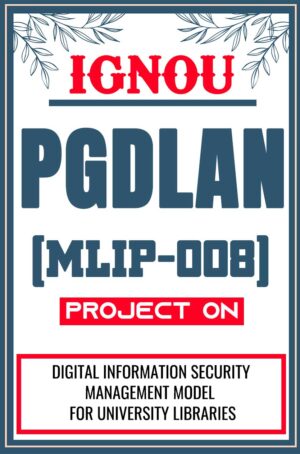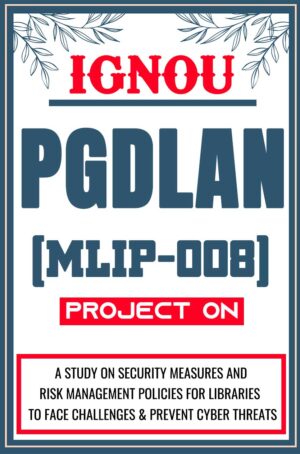Download IGNOU PGDLAN Project (MLIP-8)
Do you require help with your IGNOU PGDLAN Project with the code MLIP-8? We are here to provide the assistance and specialized knowledge required to excel in this crucial aspect of your program. The MLIP-8 project in Library Automation and Networking offers a distinct chance for you to utilize your expertise in library science to address real-world problems in the digital era. If you require specialist help and expert counsel for your project, please do not hesitate to contact us at 9958947060.
Whatsapp us to get the Personalized (Customized) or Readymade IGNOU PGDLAN Project Report or PGDLAN Synopsis
The Post Graduate Diploma In Library Automation And Networking is a specially designed innovative program that would help students gain thorough practical training so that the technological skills of the learners would be developed, enabling them to establish, enhance, and manage a computerized library and information center all by themselves. This would allow the students to perform much better in automated or networked environments. Such a practical program as the PGDLAN emphasizes project works and dissertations. Now to undertake a project work involves a lot of research and data collection and analysis. In such scenarios, many students, especially the ones working full-time or having difficulty in writing, seek help from some reliable service providers to do their work. In such cases, our company serves as a trusted and dependable source for providing you with genuine and unique solutions for your IGNOU PGDLAN Project (MLIP-8).
What is the duration of the IGNOU PGDLAN Project (MLIP-8) offered by IGNOU?
The PGDLAN program is typically designed to be completed in one year. It consists of both theory and practical components.
What are the eligibility criteria for admission to the IGNOU PGDLAN Project (MLIP-8)?
The eligibility criteria for admission to the PGDLAN (MLIP-8) program at IGNOU is quite specific:
- Bachelor’s Degree Requirement: You must possess a Bachelor’s Degree in Library and Information Science (BLIS) from a recognized university [IGNOU PG Diploma in Library Automation and Networking Admission 2024: Course Details, Eligibility & Fees].
- Minimum Marks Requirement: There’s a minimum marks requirement for your BLIS degree. You need to have secured at least 50% marks in your BLIS program from a UGC-approved university [IGNOU PG Diploma in Library Automation and Networking Admission 2024: Course Details, Eligibility & Fees].
IGNOU PGDLAN Project Topics (MLIP-8)
- Prospects Of Using Open- Source Library Management Software In College And University Libraries
- A Study On Security Measures And Risk Management Policies For Libraries To Face Challenges And Prevent Cyber Threats
- A Study On Designing Digital Information Security Management Model For University Libraries
- A Study To Explore The Impact Of Electronic Resources In Modern Library And Information Centers
What are the key subjects covered in the IGNOU PGDLAN project curriculum (MLIP-8)?
The IGNOU PGDLAN program (MLIP-8) curriculum focuses on equipping students with the knowledge and skills to manage libraries in the digital age. Here’s a breakdown of the key subjects covered:
Foundation Courses:
- Introduction to Computers (MLI-001): This course provides a basic understanding of computer hardware, software, and operating systems.
- Library Automation (MLI-002): This course introduces students to the concepts and applications of library automation software in managing library operations.
Core Courses:
- Information Systems (MLI-003): This course delves into information systems design, management, and retrieval techniques used in libraries.
- Networking and Internet Technology (MLI-004): This course equips students with the knowledge of computer networks, internet protocols, and their application in libraries.
- Internet Resources (MLI-005): This course explores various online information resources and search strategies for effective information retrieval.
- Content Development (MLI-006): This course teaches students how to create and manage digital content for libraries, including websites and online databases.
- Programming (MLI-007): This course provides a basic understanding of programming languages relevant to library automation tasks.
Project Work (MLIP-008):
This is the culminating aspect of the program. Students undertake an independent project that allows them to apply the acquired knowledge and skills to a real-world library automation challenge.
What are the career prospects after completing IGNOU PGDLAN Project (MLIP-8)?
Completing the PGDLAN (MLIP-8) program from IGNOU equips you with valuable skills and knowledge for a variety of career opportunities in the library and information science field, particularly with a focus on digital libraries and information management. Here are some potential career paths:
- Library Assistant/Associate: This role involves assisting librarians with day-to-day operations, including circulation, cataloging, and user services. With your PGDLAN qualification, you’ll be well-positioned to handle tasks related to library automation systems and digital resources.
- Digital Librarian: This role involves managing and maintaining digital libraries, including digitizing resources, creating online catalogs, and ensuring accessibility. Your PGDLAN knowledge of library automation, information systems, and content development will be highly relevant.
- Information Specialist: This role involves researching and providing information to users in various sectors. Your expertise in information retrieval techniques and online resources gained through the program will be valuable assets.
- Knowledge Management Specialist: This role focuses on developing and managing knowledge repositories within organizations. Your understanding of information systems and content development can be applied to create effective knowledge management systems.
Beyond Traditional Roles:
The PGDLAN program’s skills can also be valuable in non-traditional library settings:
Educational Institutions: You can work in academic libraries or educational technology departments, supporting the use of digital resources and online learning platforms.
Corporate Libraries: Many businesses have internal libraries or information centers. Your expertise can be applied to manage and maintain these resources.
Museums and Archives: These institutions are increasingly using digital technologies. Your knowledge can be useful in managing digital collections and ensuring accessibility.
Important Factors:
Experience: While the PGDLAN program provides a strong foundation, relevant work experience can significantly enhance your career prospects.
Specialization: Consider pursuing additional certifications or training in specific areas like digital preservation or data analysis to further specialize your skillset.
Networking: Build connections with professionals in the field through library associations or online communities.
What is the structure of the IGNOU PGDLAN Project Report (MLIP-8)?
The IGNOU PGDLAN (MLIP-8) project report follows a specific structure to ensure clarity and proper presentation of your research. Here’s a breakdown of the key components:
Preliminary Pages
- Title Page: This includes the program title (PG Diploma in Library Automation and Networking), project title, your name, enrollment number, and study center details.
- Certificate: A certificate from the student declaring the originality of the work and seeking approval from the evaluator.
- Acknowledgement: Express gratitude to your supervisor, faculty members, or anyone who provided significant guidance or support during the project.
- Table of Contents: A detailed list of chapters, sub-chapters, figures, tables, and appendices with corresponding page numbers.
Main Report
Chapter 1: Introduction:
- Briefly introduce the concept of library automation and networking.
- State the specific problem or challenge your project addresses.
- Highlight the significance and objectives of your project.
Chapter 2: Review of Related Literature:
- Review existing literature relevant to your project topic.
- Discuss previous research findings and identify any gaps in knowledge.
- Demonstrate your understanding of the theoretical underpinnings of your project.
Chapter 3: Research Methodology:
- Explain the research methodology used in your project (e.g., survey, case study, data analysis).
- Describe the data collection methods and tools used.
- Discuss the sampling technique employed, if applicable.
Chapter 4: Data Analysis & Interpretation:
- Present your findings in an organized manner using tables, figures, and charts.
- Analyze the data using appropriate statistical methods, if relevant.
- Interpret the findings and explain their significance in relation to your research objectives.
Chapter 5: Conclusion and Recommendations:
- Summarize the key findings and their implications for library automation practices.
- Provide recommendations based on your research conclusions.
- Suggest areas for further research.
End Matter
- Bibliography: List all the sources you cited in your report using a standard referencing style (e.g., APA, MLA).
- Appendices: Include any supplementary materials like questionnaires, interview transcripts, or detailed data tables that wouldn’t fit well within the main report.
What are the software and tools commonly used in the IGNOU PGDLAN Project (MLIP-8)?
The specific software and tools used in your IGNOU PGDLAN (MLIP-8) project depend heavily on the chosen topic and its requirements. However, there are two main categories to consider:
Library Management Software (LMS):
These are software applications designed specifically for managing library operations. They might not be directly used for your project development, but understanding their functionalities can be beneficial for various project themes. Some popular LMS options include:
- Koha: An open-source LMS known for its user-friendliness and customizability.
- DSpace: An open-source digital repository software often used for archiving and access management.
- Greenstone: An open-source digital library software suite for building and managing digital collections.
- LibSys: A commercial LMS offering a variety of features for library automation tasks.
General Purpose Tools:
These tools can be used for various aspects of your project work, irrespective of the specific topic:
- Word Processing Software (e.g., Microsoft Word, LibreOffice Writer): For creating your project report, including text formatting, referencing, and data tables.
- Spreadsheet Software (e.g., Microsoft Excel, LibreOffice Calc): For data analysis, creating charts and graphs, and statistical calculations (if applicable to your project).
- Presentation Software (e.g., Microsoft PowerPoint, LibreOffice Impress): For creating presentations to showcase your project findings (optional).
- Data Analysis Software (e.g., SPSS, R): For more advanced statistical analysis, especially if your project involves large datasets (not always necessary for PGDLAN projects).
- Survey Tools (e.g., Google Forms, SurveyMonkey): If your project involves collecting data through surveys or questionnaires.
How can you access resources and materials needed for your IGNOU PGDLAN Project (MLIP-8)?
Here are some ways to access resources and materials for your IGNOU PGDLAN (MLIP-8) project:
Official IGNOU Resources:
- eGyanKosh: This is your primary source for official IGNOU study materials. Navigate to the School of Social Sciences (SOS) > PG Diploma Programmes > PGDLAN. Here, you’ll find the latest PDFs for all the program courses, including the project guide (MLIP-008) [IGNOU eGyanKosh ON egyankosh.ac.in].
- IGNOU Programme Guide: Download the PGDLAN program guide from the IGNOU website. It provides an overview of the program structure, course descriptions, and evaluation methods. This guide might offer insights into potential project topics or approaches.
Online Resources:
- Library and Information Science Websites: Several websites cater to library professionals and students. These websites might offer project ideas, research methodologies, and relevant articles. However, ensure the information aligns with IGNOU guidelines and avoid plagiarism.
- Online Databases: Consider using online academic databases like JSTOR, ScienceDirect, or IEEE Xplore (if your university or library provides access). These databases offer access to peer-reviewed research papers and scholarly publications that can be valuable sources of information for your project.
- Open Educational Resources (OERs): Many universities and organizations offer free online resources on various topics. Explore OER platforms for relevant materials related to library automation, information systems, or digital libraries.
Get your IGNOU PGDLAN Project Report and Synopsis Sample PDF (MLIP-8)
- Call us or WhatsApp us at: 9958947060, 9354637830
- Visit: SHRICHAKRADHAR.COM
-
Sale!

-
Sale!

IGNOU PGDLAN Project (MLIP-008) Synopsis/Proposal & Project Report/Dissertation in Soft-Copy (Sample-4)
Original price was: ₹499.00.₹149.00Current price is: ₹149.00. -
Sale!

IGNOU PGDLAN Project (MLIP-008) Synopsis/Proposal & Project Report/Dissertation in Soft-Copy (Sample-3)
Original price was: ₹499.00.₹149.00Current price is: ₹149.00. -
Sale!

IGNOU PGDLAN Project (MLIP-008) Synopsis/Proposal & Project Report/Dissertation in Soft-Copy (Sample-2)
Original price was: ₹499.00.₹149.00Current price is: ₹149.00.




